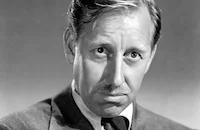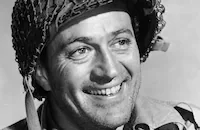Hannah Lee
Cast & Crew
John Ireland
Macdonald Carey
Joanne Dru
John Ireland
Harold J. Kennedy
Tom Powers
Film Details
Technical Specs

Synopsis
Texas gunfighter Bus Crow arrives in Pearl City and orders Willie Stiver, the young son of the livery stable owner, to stable his horse. After Willie talks back to Crow, Crow slaps the boy and goes into Hannah's Place, the local saloon. When Willie's father Gare comes into the saloon to confront Crow and draws his gun, the gunfighter shoots the weapon out of Gare's hand. Saloon owner Hallie orders her bartender, Paulson, to give Crow a drink, and Crow asks where he can find work. When Paulson tells him that cattle ranchers are shutting down because squatters are encroaching on their land and stealing cattle, Crow surmises the job prospects are poor. Out on the range, rancher Jeff Montgomery and his foreman, Bill Crashaw, discover a butchered cow and confront neighboring squatter Carey Miller. Although Miller has been stealing from their herd, he denies their accusations. Montgomery and two other ranchers, John Britton and Alesworth, later decide to take action against the squatters. Although Britton resists the use of violence, Montgomery and Alesworth insist on hiring Crow to warn the squatters to leave the area. That night, Hallie brings a note from the ranchers to Crow, who assumes that she is seeking romance with him and forces a kiss on her, but Hallie angrily rebuffs him. Crashaw later appears in Crow's hotel room and brings him at gunpoint to meet the ranchers, who are hidden behind a curtain. An unidentified rancher then informs Crow that he will be given $600 for every squatter he persuades to leave Pearl City rangeland. The rancher insists that killing be avoided, and gives Crow the first two names and a one-hundred dollar advance. Miller, the first person on the list, tears up a warning notice secretly posted by Crow. After Crow observes Miller and his men raiding a herd, Crow shoots Miller in the back. One evening, Hallie's saloon closes for a cattlemen's association party, but when she invites Willie to have some food, Crow also demands admittance. Crow forces Hallie to dance with him but when he insinuates that she is romantically interested in him, she walks away. Charles Beven is the next homesteader to receive a notice from Crow, and although he attempts to outwit the killer, he, too, is murdered. When three law-abiding homesteaders, including Gus Bainbridge, confront the sheriff and accuse him of failing to protect them because they are newcomers, the sheriff admits that they are right, but that he has no evidence as to the killer's identity. Crow murders Bainbridge soon after. Some time later, at the homesteaders' request, U.S. Marshal Sam Rochelle arrives and immediately suspects Crow, whom he encounters in the saloon. However, Sam's investigation is stymied because local residents are too scared to give him any useful information. The ranchers send Crashaw to Sam's hotel room to pay him off, but Sam distrusts Crashaw and attacks him, accidentally causing a fire when a lamp is knocked over in the fray. When Crashaw attempts to escape through the window, Sam shoots him and kills him. Hallie believes that Crashaw's death vindicates Crow as the killer and visits him in his room with a bottle of champagne to celebrate. She quickly rejects him again when he admits that he is the killer and threatens her if she tells anyone what she now knows. The next day, Crow watches as Hallie meets with Sam, her former lover who was involved in the arrest and conviction of her brother. Hallie refuses to help him convict Crow, who follows her when she rides out of town. When Hallie falls from her rearing horse but is unharmed, Crow confronts her and she assures him that she has kept his secret because she did not want to be responsible for his death. Later, when Willie is alone searching for a lost calf, he sees Crow withdraw his Mannlicher rifle from a hiding place in some rocks. Crow hears him in the brush and fires indiscriminately, discovering only afterward that he has shot a boy. Although he displays some remorse, Crow leaves his trademark shell casing by Willie's unconscious body. In a conversation with the deputy sheriff, Sam identifies the collected shell casings as those from a Mannlicher rifle, which was used in the war in Cuba where both he and Crow fought. Sam and Hallie independently follow Crow when he again rides into the hills. Sam attempts to prevent Crow from retrieving his weapon, but Crow knocks him unconscious by pushing him over a low cliff. After Sam recovers, he continues to pursue Crow, who refuses to surrender and wounds Sam in the arm. Before Crow can kill Sam, however, Hallie shoots and kills the gunfighter. Hallie admits to Sam that she was wrong to protect Crow, and they return to town together.

Cast

Macdonald Carey

Joanne Dru

John Ireland
Harold J. Kennedy

Tom Powers
Ralph Dumke
Stuart Randall

Frank Ferguson

Don Haggerty
Peter Ireland
Tris Coffin
Alex Pope
Kay Riehl
Ruth Whitney
Dean Cromer
Norman Leavitt
Paul Keast
Robin Morse
Joe Mcguinn
Bill Hale
Dick Fortune
Alex Fraser
Mort Mills
Ferris Taylor
Ann Loos
Crane Whitley
Charles Keane
Helen Servis
Crew
Dan Alexander
Judd Bernard
Edward G. Boyle
Jack Broder
Bart Carré
Ben Chapman
Paul Dunlap
John Fletcher
Lee Garmes
Lee Garmes
Edward J. Garvin
John Ireland
Stan Jones
Mackinlay Kantor
Harold J. Kennedy
Sue Kirkpatrick
Frances Kyle
H. J. Ludwin
Jim Masterson Sr.
Gordon Mclean
William J. Mclellan
Robert Olivas
Jack Rabin
Mark Reedall
Edward Sampson Jr.
Chester Schaffer
David Simmons
Earl Snyder
Ben Southland
Jerry Thomas
Leslie Thomas
Rip Van Ronkle

Film Details
Technical Specs

Quotes
I didn't catch the name, stranger.- Crow
I didn't throw it.- Rochelle
So what do they call you, stranger?- Crow
Rochelle, Sam Rochelle.- Rochelle
Ah, so you're the Marshal. What do you expect to find in Pearl City, Marshal? Pearls?- Crow
Maybe pearls. Maybe swine.- Rochelle
When I was a kid, I killed gophers for money. Then I killed Indians and Spaniards for money. Now I just kill for money.- Crow
Nobody really cares if a man's cut down from the front or the back... as long as he deserves killin'.- Bus Crow
Trivia
In his autobiography, "The Days of My Life," actor MacDonald Carey writes candidly of his work on this film: "John (Ireland) and I were not happy with the ending in the script. Both of us, heavy drinkers at the time, sat up late at night... drinking and re-writing the conclusion."
Notes
The opening title credits read "Jack Broder presents Hannah Lee An American Primitive," and are immediately followed by the writing credits: "Screenplay by MacKinlay Kantor and Rip Van Ronkle, From the Novel Wicked Water by MacKinlay Kantor." An alternate release title of this film was Outlaw Territory; contemporary advertising listed both titles. Hannah Lee was released in both 2-D and 3-D formats. A June 1953 news item in American Cinematographer noted that the film was shot using the twin-Camerette 3-D system by Stereo-Cine Corp. Although the Daily Variety review has a note that the film was shot in Technicolor, PatheColor is credited in the body of the review as well as all other sources.
According to various contemporary news items, then husband and wife team John Ireland and Joanne Dru filed a lawsuit against the production company for unpaid profits to which they claimed entitlement, and for lack of sufficient publicity. Jack Broder Productions filed a countersuit alleging that Ireland, who directed and produced the film in association with Lee Garmes, overshot the production budget due to changes in the script and delays in filming. The final outcome of the lawsuit has not been determined. Hannah Lee marked Ireland's feature film directorial debut. Actor Peter Ireland is the son of the director and his first wife, Elaine.












